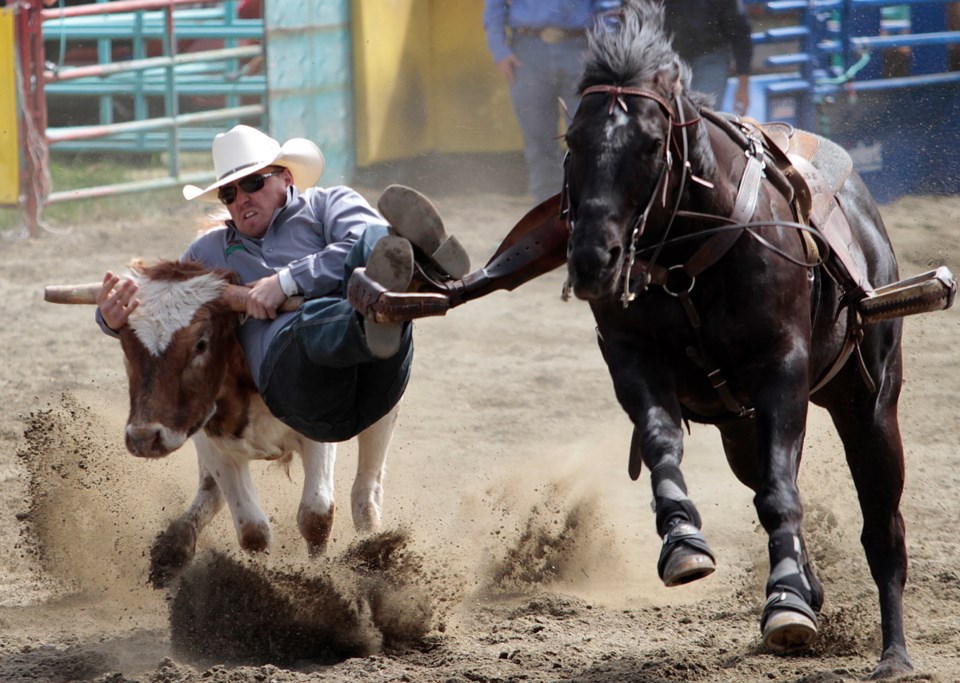As Langford’s controversial Luxton Rodeo approaches on May 17-19, public opposition to the event is increasing. Yet, as the outcry gets louder, rodeo organizers and Langford council are keeping their heads down and bucking the issue of animal-welfare concerns.
Langford council has refused to hear any formal presentation by concerned citizens. Mayor Stew Young stated in a Times Colonist article in August 2012 that “he does not want his council weighing in on the discussion because the politicians are not experts on animal safety issues.”
“If they [the rodeo events] are inhumane, and [the groups] can prove it, then change it, but I have no authority over these types of issues,” he said.
It would appear that Young and Langford council are unaware of what authority they carry.
The municipal councils of both Victoria and Oak Bay had no difficulty in approving amendments to their bylaws that prohibit the operation of a public show, exhibition, carnival or performance in which animals are required to perform tricks, fight or otherwise participate for the amusement or entertainment of an audience.
There are some exceptions, but only if the event does not use or treat any animal in an inhumane manner for profit or advantage.
On April 11, Bill Bennett, one of the organizers for the Luxton Rodeo, was asked by CBC interviewer Michael Tymchuk: “When you have those events, have any animals been injured or killed?”
Bennett relied: “I won’t answer that question … It’s part of the rodeo.”
Professional rodeo associations and event operators describe the animals as “competitors” and “animal athletes” and want the public to marvel at the skill of the cowboy as he triumphs in calf-roping. The cowboy is master of the saddle in his battle with the bucking bull or horse and they glorify the athleticism of the tenacious horse or ferocious bull that tosses the rider on his head.
But there is a veiled lie woven into this perception: that the animals, though not willing participants, rise to the challenge and at times, the bull, steer or horse wins.
However, when a calf or steer leaves the chute and hears the thunder of hooves rushing from behind, accompanied by the roar of the crowd, the calf or steer is running away from the horse and rider because it fears for its life, not because it hopes to best the cowboy.
The bucking horse or bull, with an unwanted rider on its back and a strap cinched around its flank close to its genitals, gets a sharp prod or electric shock when the gate flies open and is acting in distraught self-defence when it bucks and contorts wildly to free itself of both the flank strap and rider.
The motivations for the actions by rodeo animals are fear, pain and self-preservation. They are intensely stressed and will do whatever they can to relieve their fear, even at risk of injuring themselves.
Injuries to the animals, such as internal organ bruising, hemorrhaging, bone fractures, ripped tendons and torn ligaments and muscles, are more common than rodeo associations admit and many injuries go undetected.
I can imagine how the public react would if a Labrador retriever were let loose in the ring and the horseman’s task was to rope it, throw it to the ground and immobilize the dog.
Many people have trouble with this comparison. A dog is so much different than a calf, but it’s not about intelligence or that one animal is a companion and the other livestock. It’s about the animal’s fear of impending death.
An uncomfortable facet of this is the subtle message that we impress on our children when we take them to an event that places animals in a position of injury, suffering and fear, that it is morally acceptable for people to cause animals suffering for entertainment.
There are many other ways that we can entertain ourselves without subjecting an animal to being chased, roped, thrust to the ground and immobilized, even if it’s only for a few seconds.
Our empathic concern should extend beyond humans, dogs and cats, and should enfold all animals that suffer needlessly at our hands.
Steve Huxter of Victoria is a former professional marine-mammal trainer turned animal-rights advocate.



